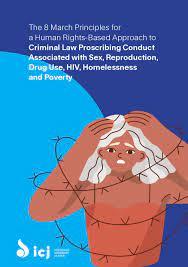
https://www.icj.org/icj-publishes-a-new-set-of-legal-principles-to-addre...
The 8 March Principles for a Human Rights-Based Approach to Criminal Law Proscribing Conduct Associated with Sex, Reproduction, Drug Use, HIV, Homelessness and Poverty were developed over a five-year consultative process, following an initial expert meeting of jurists convened in 2018 by the ICJ – together with the Joint UN Programme on HIV/AIDS (UNAIDS) and the Office of the High Commissioner for Human Rights (OHCHR) – to discuss the role of jurists in addressing the detrimental human rights impact of certain criminal laws. The process of elaboration of the 8 March Principles included expert jurists, academics, legal practitioners, human rights defenders and various civil society organizations working in diverse legal traditions. The principles are now available for download on the ICJ website
Alongside the OHCHR, UNAIDS, the World Health Organization, the UN Development Programme, Colombia, Luxembourg, Switzerland, Amnesty International, the International Bar Association’s Human Rights Institute and the Global Commission on Drug Policy, the ICJ will present and hold a discussion on the principles during a side event at the 52nd Session of the UN Human Rights Council today in Geneva at the UN. The event will explore the contribution the 8 March Principles make and their relevance in addressing the detrimental human rights impact of criminal laws proscribing the above-mentioned conduct, with a specific focus on the harmful impact of such laws on women’s human rights and gender equality.
The principles are aimed at offering a clear, accessible and operational legal framework and practical legal guidance – based on general principles of criminal law and international human rights law and standards – on the application of the criminal law to conduct associated with:
- sexual and reproductive health and rights, including abortion;
- consensual sexual activities, including in such contexts as sex outside marriage, same-sex sexual relations, adolescent sexual activity and sex work;
- gender identity and gender expression;
- HIV non-disclosure, exposure or transmission;
- drug use and the possession of drugs for personal use; and
- homelessness and poverty.
They aim to assist legislatures, the courts, administrative and prosecutorial authorities, and advocates to address the harmful impact of criminalization of the above-mentioned conduct on health, equality and other human rights.










Add new comment